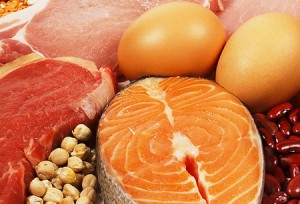Protein, how much to eat?
 How much protein should I eat? Adequate protein intake has been a major concern for many women for a very long time. I would have to say that is the number one question women ask when asking about their nutrition/diets. I think that people (mews/media) have really talked up protein intake and scared people into thinking they are not getting enough protein day to day, when in fact, most Americans meet or exceed the RDA (recommended dietary allowance) for protein. This concern is usually just a worry beceause we easily consume the protein our bodies need by eating various foods.
How much protein should I eat? Adequate protein intake has been a major concern for many women for a very long time. I would have to say that is the number one question women ask when asking about their nutrition/diets. I think that people (mews/media) have really talked up protein intake and scared people into thinking they are not getting enough protein day to day, when in fact, most Americans meet or exceed the RDA (recommended dietary allowance) for protein. This concern is usually just a worry beceause we easily consume the protein our bodies need by eating various foods.
So now you want to know a number for how many grams of protein to eat in each day. Well, just like anything, it varies from woman to woman. The RDA for a sedentary individual is 0.8 grams per kilogram of body weight. Protein needs are higher for children, teens, pregnant/lactating women because these are the crucial growing times. Also, protein intake should be higher for active women.
Average Woman needs: 0.8 grams per kilogram of body weight
Endurance Athlete Woman needs: 1.2.-1.4 grams per kilogram of body weight
Strength Athlete Woman needs: grams per kilogram of body weight
How to calculate your OWN protein needs:
1. Convert your weight from pounds to kilograms. To do this, divide your weight by 2.2. Let’s say you weight 130.
Divide 130/2.2= 59
2. Then, multiply weight in kg (59) by the RDA of protein (see chart above). If you are active endurance running, you would multiply 59 x 1.2= 70.8 which equals the amount of protein you should consume in a day
Examples of lean protein:
Chicken breast (baked, grilled, boiled, ground)
Pork tenderloin (baked, grilled, broiled)
Flank steak/ sirloin/ London Broil/ Roast Beef
Veal Roast (or a lean chop)
Lamb Roast (or a lean lamb chop)
Ham (lean)
Turkey Breast
Canned Tuna
Salmon
Herring
Sardines
Flounder
Tilapia
Grouper
Pretty much any/all fish that has been baked, grilled, broiled
Shellfish (Lobster, Crab, Clams, Shrimp, Crawfish)
Beans (make sure to rinse any canned beans so you do not have excess salt)
Cottage Cheese (low fat or fat free)
Milk (1% or skim)
Yogurt (low fat or fat free)
Egg whites/egg substitute
Eggs (just limit daily intake to no more than 2)

